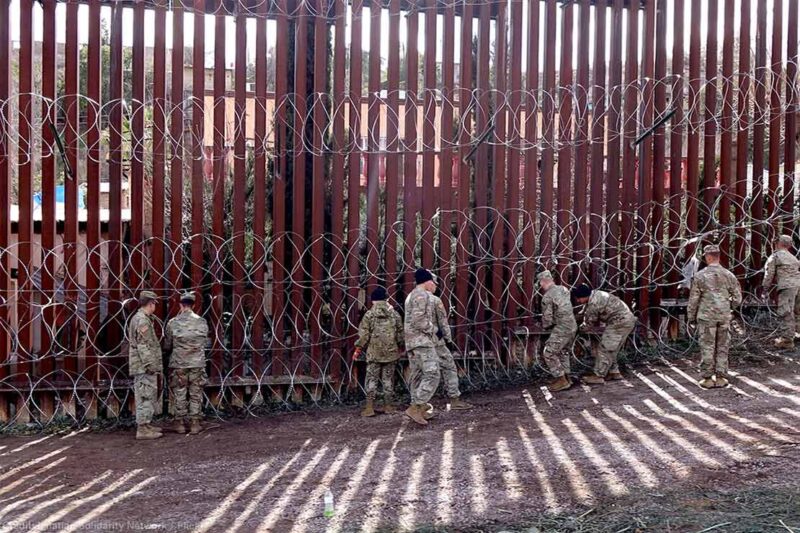The Military Should not be Searching Cars or Checking Documents at the Border


Thereās an old saying that goes, āWhen all you have is a hammer, everything looks like a nail.ā This adage is especially applicable to the Trump administrationās approach toward border policy, which is ever more militarized. On March 6th, U.S. Customs and Border Protection (CBP) officials that the Department of Defense would deploy 160 active-duty troops to ports of entry at the border ā 80 to El Paso and another 80 to San Diego.
The deployment is the latest disturbing chapter in the administrationās dangerous and inappropriate record of using the U.S. military at the border. To date, , it has expanded military presence by sending 16,000 troops ā some of whom have been active-duty service members acting under Defense Department authority and others under state National Guard deployments.
In recent months, we witnessed soldiers at primary inspection points at ports in El Paso as well as in secondary inspection areas in the Rio Grande Valley. Weāve also observed troops checking immigration documents in the of an international bridge in El Paso. Thereās no ambiguity here: The military should not be searching cars or checking documents at ports of entry. These are potentially unlawful actions, and both the Defense Department and CBP must provide answers to how and why these actions are taking place.
The deployments send a message that our government sees people arriving at the southern U.S. border as a hostile enemy force, rather than who they actually are: vulnerable asylum seekers and migrants seeking safety or a better life. And the language the administration has been using to describe the mission of those soldiers is deeply concerning. One memo they might participate in āa show or use of force (lethal force, where necessary), crowd control, temporary detention, and cursory search.ā Troops recently deployed to and have already participated in port closure drills that further militarize and terrorize border communities.
Use of the military to conduct searches or other law enforcement duties threatens this countryās long-standing separation between civilian and military government, which dates to the founding and has been reiterated by Congress in landmark statutes, including especially the . A core component of that civil-military separation is the general prohibition against the use of the military āto execute the lawā unless expressly authorized by the Constitution or an act of Congress.
The administrationās use of soldiers at the border should concern every American. The U.S. military has no business taking part in law enforcement activities like these at the border or anywhere else in the U.S. And the actions of troops weāve witnessed donāt inspire confidence that theyāre following Defense Department that are intended to limit their role.
The administrationās justification for the 160 troops deployment was unfounded claims that a ruling by a federal court of appeals potentially blocking the administrationās policy of forcibly returning asylum seekers to Mexico required military presence. The Supreme Court has allowed the policy to proceed, but the deployment of troops in response to an unfavorable court ruling is nonetheless troubling. Broadening the use of the military domestically for further unneeded fortification of our ports of entry and the continued expanding of their role raises serious civil rights concerns.
Deploying the military like this isnāt just improper, itās a misuse of public resources. have called these deployments āwastefulā and ādangerous,ā and the called a past deployment a ācolossal waste of time.ā The U.S. border is simply no place for the military.
For all these reasons, on March 18, the Ķųŗģ±¬ĮĻās National Security Project and Border Rights Center sent a letter to the Secretary of Defense and the acting head of CBP raising our concerns with the administrationās expanding use of U.S. soldiers at the border ā and the searches we documented. We asked these Trump administration officials to immediately clarify what responsibilities troops have been given at ports of entry and make public all directives and guidance issued to troops about their roles and duties. The military should not be used for law enforcement purposes, and the administration must end this practice now.
